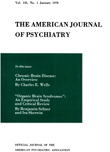THE MEMORY FUNCTION
Abstract
Fifteen individual memory tests and one intelligence test were given to sixty male neurotic army patients at Mill Hill and Sutton Emergency Hospitals. The scores on these 16 tests were intercorrelated, and the resulting table factor-analyzed. The following results were found:
1. All the memory tests correlated positively with the intelligence test, the correlation varying from +0.63 to +0.96.
2. One general factor accounted for all the correlations in the table within the limits of the probable error; this general factor accounted for 74% of the variance.
3. It was shown by two separate methods that the general factor found could be equated with general intelligence, or "g," and that all the correlations in the table could be accounted for without the necessity of postulating a "memory" factor.
4. The conclusion was drawn that the ability involved in the clinical tests of "memory" studied in this research was identical with that involved in the intelligence test used, and that therefore it was misleading to accept scores on these various tests as estimates of a person' "memory" ability.
Access content
To read the fulltext, please use one of the options below to sign in or purchase access.- Personal login
- Institutional Login
- Sign in via OpenAthens
- Register for access
-
Please login/register if you wish to pair your device and check access availability.
Not a subscriber?
PsychiatryOnline subscription options offer access to the DSM-5 library, books, journals, CME, and patient resources. This all-in-one virtual library provides psychiatrists and mental health professionals with key resources for diagnosis, treatment, research, and professional development.
Need more help? PsychiatryOnline Customer Service may be reached by emailing [email protected] or by calling 800-368-5777 (in the U.S.) or 703-907-7322 (outside the U.S.).



